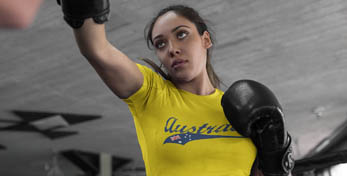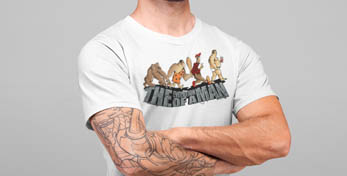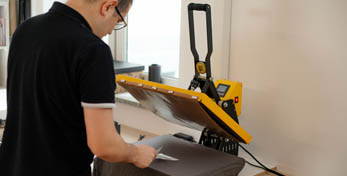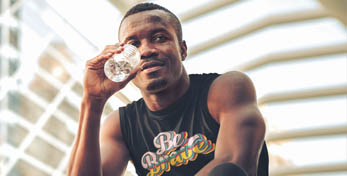T Shirt Printing Australia
Polyester Custom Printing: Techniques for Perfect Results
Recently updated on March 30th, 2024 at 09:04 am
When doing Polyester Custom Printing there a a few things to think about to ensure you get quality prints. In this article, we’ll discuss why polyester fabrics need a little more care when being printed.
Together we will look at the challenges and solutions associated with Dye Sublimation, SupaColour and UltraColour transfers as well as screen printing and Direct To Film (DTF) technology.
We’ll examine the professional equipment needed for DTF printing such as a proper heat press and ensuring accurate fitting of the transfer onto polyester t-shirts. We will also guide you through ordering custom printed polyester t-shirts at The Custom T Shirt Shop while discussing important considerations before placing an order for your DTF Transfers to be fitted onto polyester apparel.
By understanding these aspects of polyester custom printing, you can make informed decisions when selecting a suitable method for your personalised t-shirts or other apparel needs.

Table of Contents:
- The Challenges of Printing on Polyester Fabrics
- Screen Printing vs DTF (Direct To Film) Technology
- Professional Equipment Needed for DTF Printing
- Ordering Custom Printed Polyester Garments at The Custom T Shirt Shop
- Current BYO Garment Policy
- Future Plans Regarding an Online Selection
- Important Considerations Before Ordering DTF Printed Polyester Apparel
- FAQs in Relation to Polyester Custom Printing
- Conclusion
The Challenges of Printing on Polyester Fabrics
Traditionally, printing onto polyester garments such as Cool Dry T-shirts and polo’s has been a difficult and expensive process. This is due to the nature of synthetic materials which in the past required specific techniques for successful customisation. With the advent of DTF Transfers printing onto Polyester T Shirts and apparel has become much easier and the quality of the print is beter and more vibrant.
The limitations of dye sublimation for light-colored garments
Dye sublimation, while a popular choice for customising polyester apparel, is limited in its ability to only being able to be printed onto light coloured fabrics. This technique works best on light-colored garments but is not suitable for printing onto darker fabrics. Additionally, many dye sublimation printers often requires minimum orders of 10 to 20 or even more per design – making it less cost-effective for smaller businesses or individuals looking to customise just a few pieces.

High costs associated with SupaColour and UltraColour transfers
SupaColour and UltraColour are alternative methods that offer high-quality prints on various fabric types including polyester; however, they come at a premium price point compared to other options in the market. These transfer processes can be quite costly especially if you’re only looking to customize small quantities – making them unsuitable choices for those seeking affordable solutions without compromising quality.
Printing on polyester garments has traditionally been a difficult and expensive process due to the nature of synthetic materials. DTF technology offers an accessible solution that allows even single pieces to be printed affordably while maintaining high-quality results, with no minimum order quantities, vibrant colors on various fabric types, and faster turnaround times
Screen Printing vs DTF (Direct To Film) Technology
When it comes to customising apparel, there are several printing methods available. Two of the most popular options include screen printing and Direct To Film (DTF) technology. Depending on the size of your order, either screen printing or Direct To Film (DTF) technology may be better suited to meet your needs.
Traditional screen printing often may not be suitable or cost-effective for smaller orders, while DTF (Direct To Film) technology offers a more accessible solution that allows even single pieces to be printed affordably while maintaining high-quality results. In this section, we’ll explore the differences between these two methods and how DTF has revolutionised the custom apparel industry.
With traditional printing methods like screen printing, when using plastisol inks dye migration can be a problem that is difficult for them to overcome. By using a col cure acrilyc ink instead of using plastisol inks can over come this problem, but most screen printers will not be willing to go to this extra expense.
While DTF Transfers if made properly will handle the dye migration of the polyester garments much better. It is advisable to still do a colour fast test on the garment prior to fitting, as some cheaply made polyester garments will have problems with the dye migration starting at a low temperature point, this is rare as most polyester is designed for the dye migration to take point over 160°c, but it is best to still check as some cheap synthetics may start to sublimate at 100°c.
Volume requirements in screen printing
Screen printing, is a traditional technique for creating custom designs on garments, and is most cost-effective when used for large volume orders of cotton shirts.
Screen printing may not be a viable option for those needing to produce only a few items, as the process involves making individual screens for each color in the design which can take up considerable time and resources, and there is normally a setup cost associated with the work. If this traditional method is used for small amounts it can be quite an expensive process.
As such, screen printing may not be suitable for those looking to print just one or a few items.
Advantages offered by DTF technology
In contrast to screen printing’s requirements, DTF technology allows for even a single pieces to be printed affordably while maintaining high-quality results. With DTF, digital images are printed directly onto film before being transferred onto polyester or cotton shirts using a heat press. This eliminates the need for multiple screens and reduces setup costs significantly.
- Versatility: Unlike other methods that struggle with synthetic materials like polyester or cool dry fabrics, DTF works well on various types of textiles without compromising quality.
- No minimum order quantity: Since there’s no need to for an extensive initial setup with DTF, customers can order as few or as many custom printed garments as you desire. DTF allows us to print as little as one piece at an affordable price.
- High-quality prints: DTF produces vibrant, full-color images that are resistant to fading cracking, and peeling over time. This makes it an excellent choice for sports wear, active wear, and other polyester-based apparel. Feel rest assured that you can achieve stunning prints on polyester and other synthetic materials without compromising color vibrancy or quality.
- Faster turnaround times: The process involved with Direct To Film printing is generally quicker than traditional methods like screen printing – making it ideal for those who need their customised garments promptly.
In summary, while screen printing remains a popular option for large volume orders of custom apparel, DTF technology offers a more accessible solution for those looking to print smaller quantities without sacrificing quality. The Custom T Shirt Shop’s use of cutting-edge DTF equipment ensures that our customers receive the best possible results when ordering their personalised polyester garments.
Screen printing is cost-effective for large volume orders, but not suitable for small orders. DTF technology allows even a single piece to be printed affordably while maintaining high-quality results and works well on various types of textiles without compromising quality. The Custom T Shirt Shop’s use of cutting-edge DTF equipment ensures that customers receive the best possible results when ordering their personalised polyester garments.
Professional Equipment Needed for DTF Printing
When using DTF technology to print on sportswear or activewear made from synthetic materials like polyester, it’s essential to have access to professional equipment designed specifically for this purpose. In this section, we’ll discuss the importance of proper tools and techniques to create durable prints that won’t peel, crack or fade over time.
Importance of Proper Heat Press Machines
A key component in the DTF printing process is a high-quality heat press. These machines are responsible for transferring your design onto the garment by applying consistent heat and pressure across the entire surface area. It’s crucial to use a reliable heat press, as subpar equipment can result in uneven transfers, poor adhesion, and even damage to your garments.
- Selecting a suitable size: Choose a heat press with an adequate platen size that accommodates various garment sizes comfortably.
- Digital temperature control: Opt for machines featuring digital temperature controls that allow precise adjustments according to different fabric types.
- Ease of use: A user-friendly interface ensures smooth operation without any unnecessary complications during production runs.

Ensuring Accurate Placement and Alignment During The Transfer Process
Beyond having professional equipment, it’s equally important to take great care when positioning designs onto polyester garments before pressing them into place. This helps guarantee accurate placement while preventing issues such as misaligned graphics or distorted images caused by improper handling during transfer application. Here are some tips on how best to align your designs:
- Pre-press the garment: Before applying your design, give the t-shirt a quick pre-press to remove any wrinkles or moisture that could affect the adhesion.
- Use alignment tools: Employing specialised alignment tools, such as T-shirt guide ruler, can help ensure consistent placement across multiple garments.
- Maintain proper pressure settings: Apply even pressure throughout the transfer process by adjusting your heat press machine’s settings accordingly. This will prevent unwanted creases or folds from forming on your finished product.
- Use a coversheet of teflon or parchment paper. The use of heat proof tape can also aid in polyester custom printing by keeping the transfer in the desired position.
In conclusion, investing in professional equipment and mastering essential techniques are crucial factors when it comes to achieving high-quality DTF prints on polyester garments. By applying the outlined tips, you can create amazing customised clothing that will remain durable and look great for a long time.
To create durable prints on synthetic materials like polyester, it’s important to have access to professional equipment designed for DTF printing. A high-quality heat press is crucial in the process and should feature digital temperature control, and an adequate platen size, and a user-friendly interface. Accurate placement and alignment during transfer application can be achieved by pre-pressing the garment, using alignment tools such as T-shirt rulers or guides, and maintaining proper pressure settings throughout the process.
Ordering Custom Printed Polyester Garments at The Custom T Shirt Shop
At The Custom T Shirt Shop, we understand the importance of providing high-quality, custom printed polyester garments for our customers. Whether you’re a tradie looking to get your company logo on high-vis polyester t-shirts and polos or simply want unique sportswear, we’ve got you covered. In this section, we’ll discuss our current BYO garment policy and future plans regarding our online ordering.
Current BYO Garment Policy
If you have a specific polyester garment in mind that you’d like to customise with DTF printing, feel free to bring it into our shop. We can accommodate as little as one t-shirt or piece of apparel for your order. Our skilled team will work closely with you to ensure that your design is accurately transferred onto the fabric using professional equipment designed specifically for this printing method, and we will use the correct settings for synthetic materials such as polyester.
Future Plans Regarding an Online Selection
We are constantly working towards improving our services and offering a wider range of products. As part of these efforts, we are plan on adding a dedicated range of customisable polyester garments directly through our website in the coming months. This means that soon enough, ordering custom printed sports wear or active wear made from synthetic materials like cool dry or dri fit fabrics will be even more convenient.
Tips for Preparing Your Design Files
- High-resolution artwork: To achieve optimal results when transferring your designs onto your T Shirts and apparel, make sure your artwork files are provided in high resolution (300 dpi minimum).
- PNG format preferred: While we can work with a variety of file formats, PNG files are preferred for their ability to maintain transparency and image quality during the printing process.
- Consider garment color: When creating your design, keep in mind that certain colors may appear differently on various fabric types and shades. If in doubt, speak to our friendly staff about how your artwork will look on the product.

In addition to offering custom printed polyester garments using DTF technology, The Custom T Shirt Shop also provides a wide range of other customisation services such as DTG, screen printing and embroidery. For further customisation options, take a look at our website now.
The Custom T Shirt Shop offers high-quality custom printed polyester garments using DTF printing technology. Customers can bring in their own garment or choose from our online selection, and should prepare their design files with high-resolution artwork and consideration for garment color. We also provides other customisation services such as screen printing and embroidery.
Important Considerations Before Ordering DTF Printed Polyester Apparel
Before you order custom printed T shirts and apparel made from polyester using DTF technology, there are a few things to be aware of. From transfer costs and artwork requirements to the time it takes for prints to completly harden on the apparel, understanding these factors will help ensure that your finished product meets expectations.
Transfer Pricing Based on Size
The cost of transferring your design onto polyester garments is done at a flat rate, and the more you purchase the biger the discount. If you purchase 5+ items you will receive 5% discount, and the more you buy the cheaper it gets. It’s easy to order on our website, but if you want a little more information please talk to our team at The Custom T Shirt Shop before placing an order so that we can make sure we help you get the outcome you are looking for.
High-Resolution Artwork Requirements
To achieve the best possible results when printing your design onto polyester, high-resolution artwork is necessary. Low-quality images or graphics may result in blurry or pixelated prints that do not meet your desired standards. We recommend providing high resoloution .png files with a transparent background where ever possible, or vector files in .ai or .eps file types. If using files like .JPG, make sure they have a minimum resolution of 300 dpi at the actual print size.
Tips for Preparing Your Artwork:
- Create designs using professional graphic software like Adobe Illustrator or Photoshop.
- If using images from websites, ensure they are high resoloution as low resolution files will likely lead to poor print quality.
- If unsure about file formats and resolutions required, talk with our experienced staff who can guide you through this process.
Print Curing Times (24 Hours)
After your polyester garments have been printed using DTF transfers, the transfer needs time to harden and bond with the fabric, typically taking 24 hours, this is depending on environmental conditions. While the print will feel finished after fitting it’s advisable to not wash or overly strech the print for the first 24 hours.
In order for your custom printed polyester apparel from The Custom T Shirt Shop to meet our high standards of excellence, it’s essential that you understand these important considerations before placing an order. By providing high-resolution artwork, being aware of our pricing, and allowing adequate time for print curing, you can ensure a successful outcome for your project.
Before ordering custom printed polyester apparel using DTF, it’s important to consider our pricing, being able to supply high-resolution artwork. To achieve the best possible results, use professional graphic software and consult with our experienced staff for guidance. Additionally, allow adequate time for the print to curing.
FAQs in Relation to Polyester Custom Printing

What Type of Printing is Best for Polyester?
Direct to Film (DTF) is the most suitable option for printing on polyester due to its ability to produce high-quality, durable prints on various fabric types and colors. DTF offers advantages over other methods like dye sublimation, SupaColour, UltraColour transfers, and screen printing.
Can Polyester Be Printed?
Yes, polyester can be printed using different techniques such as Direct To Film (DTF), dye sublimation, or HTV (heat transfer methods). However, DTF is considered the most effective method due to its versatility and compatibility with dark-colored garments.
Can You Customise on Polyester?
Absolutely. Polyester garments can be customised through various techniques including DTF Printing at The Custom T Shirt Shop. With proper artwork requirements met and accurate placement during the transfer process, custom designs will look professional while maintaining their original appearance even after multiple washes.
Conclusion
Overall, Polyester Custom Printing presents unique challenges and considerations that must be taken into account when ordering your custom printed T-shirts and apparel. Dye sublimation has limitations for use on light-coloured garments, while SupaColour and UltraColour transfers can come with high costs.
Screen printing may have some setup costs and limitations that make it unsuitable for small synthetic material jobs, but DTF technology offers several advantages. However, it’s important that professional equipment such as proper heat press is used to ensure accurate placement and bonding of the print during the transfer process. At The Custom T Shirt Shop, customers can take advantage of a BYO garment policy our range of online apparel.



